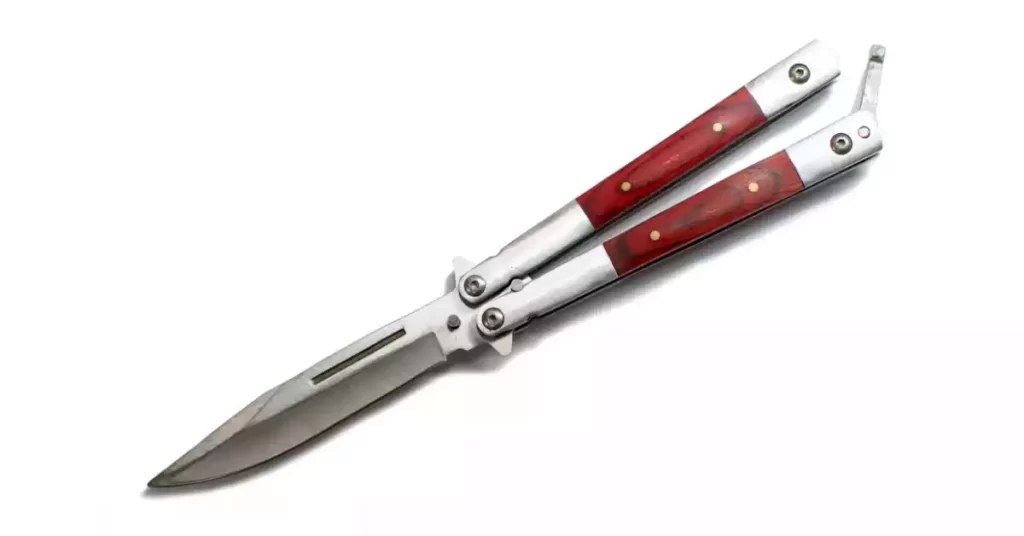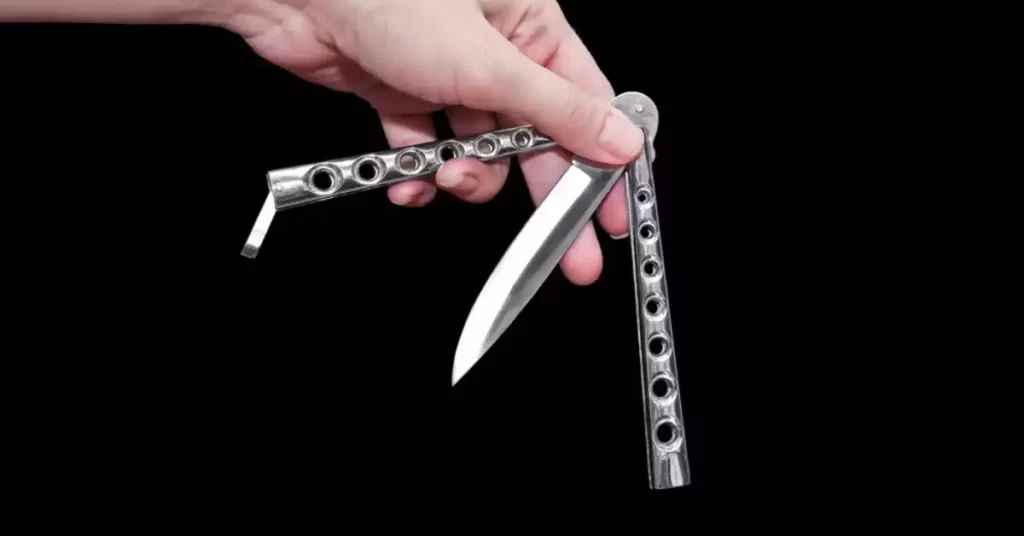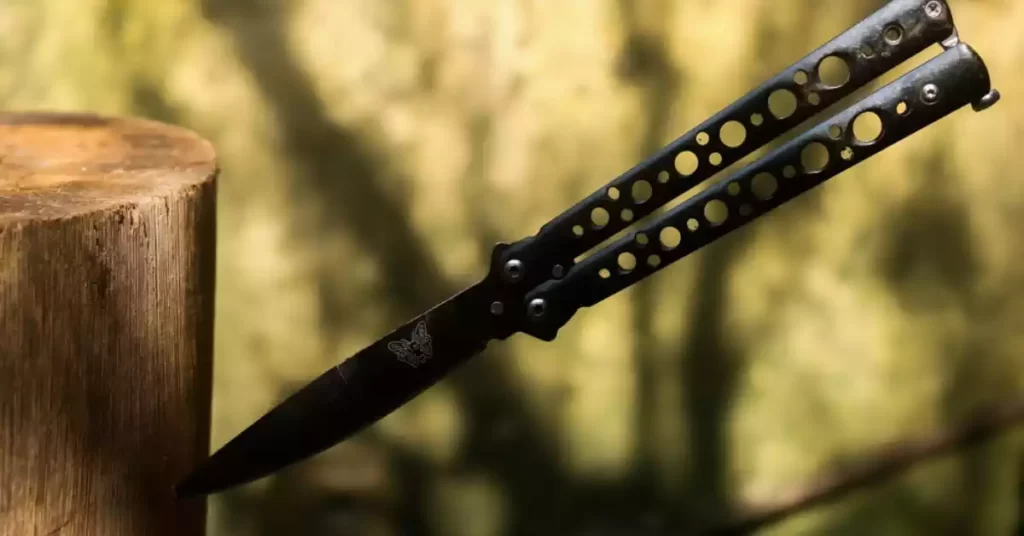Butterfly knives, often referred to as Balisong knives, have a distinct and diverse history. Originating in the Philippines, these knives have captured the attention of knife enthusiasts and martial arts practitioners around the world due to their unique design and flashy flipping tricks. Today, they come in a variety of shapes, sizes, and styles, including curved and straight blade variants.
The curved butterfly knife is known for its sweeping, crescent-like blade. Its ergonomic design makes it a favorite choice for those who value comfort and efficiency in cutting tasks. On the other hand, the straight butterfly knife, classic and straightforward, is preferred by traditionalists who love the simplicity and directness it offers.
The difference between these two knife variants goes beyond their aesthetics. It extends to their handling, functionality, and the user’s comfort, affecting the overall user experience.
Understanding Curved Butterfly Knives
Butterfly knives are distinguished by their unique handle design, which allows the blade to be concealed within the handles when closed. The curved variant takes it a step further by introducing a curved blade, which can greatly influence the knife’s performance and utility.
Structure and Characteristics
The defining feature of curved butterfly knives is their curved blade, reminiscent of a talon or a hook. This design impacts the knife’s functionality, especially in tasks like slicing and cutting. The curved blade provides additional leverage, enabling the user to perform tasks with less effort and more efficiency.
Pros of Using Curved Butterfly Knives
Curved butterfly knives offer a distinctive advantage in cutting tasks. The curvature of the blade allows for a longer cutting surface, making them ideal for tasks that require slicing or cutting through materials. Their ergonomic design is also beneficial, providing a comfortable grip for prolonged use.
Cons of Using Curved Butterfly Knives
Despite their advantages, curved butterfly knives may not be the best choice for all users. The curved blade design may require getting used to, especially for novices or those accustomed to using straight knives. Additionally, the curvature can limit the knife’s performance in tasks that require a straight, precise cut.

Spotlight on Straight Butterfly Knives
Straight butterfly knives, the more traditional of the two, also have unique characteristics that differentiate them from their curved counterparts.
Design and Features
Straight butterfly knives, as their name implies, feature a straight blade. This design, while simpler than the curved blade, provides practical benefits. The straight edge offers precision and uniformity, making these knives particularly suitable for tasks requiring clean, precise cuts.
Benefits of Straight Butterfly Knives
One of the key advantages of straight butterfly knives is their versatility. Their straight edge is effective for a wide range of tasks, from chopping to slicing to puncturing. In addition, they are easier to control and handle, making them a good choice for beginners learning the ropes of butterfly knife flipping.
Drawbacks of Straight Butterfly Knives
However, straight butterfly knives have their limitations. They may not be as efficient as curved knives in slicing tasks, and their simple design may lack the appeal and comfort of ergonomic designs.
Curved vs Straight Butterfly Knives: Key Differences
While both curved and straight butterfly knives are capable tools, the differences in their design lead to a few key distinctions in their use and performance.
Design Comparison
The main difference lies in their blade design. The curved butterfly knife, with its talon-like blade, provides an extended cutting surface, making it more efficient in slicing tasks. On the contrary, the straight butterfly knife, with its straightforward design, is versatile and offers precision in cutting tasks.
Ease of Use
When it comes to ease of use, the straight butterfly knife may have an edge, especially for beginners. Its simple design is easier to control, whereas the curved blade may require a learning curve.
Performance Differences
In terms of performance, the choice between a curved and straight butterfly knife depends largely on the intended use. For tasks requiring slicing or a longer cutting surface, the curved knife may outperform the straight one. However, for tasks that demand precision, the straight knife would be a better choice.

Choosing Between Curved and Straight Butterfly Knives
When it comes to choosing between a curved and straight butterfly knife, there are a few factors to consider.
User’s Skill Level
If you’re a beginner, a straight butterfly knife may be easier to handle due to its simplicity and control. On the other hand, more experienced users may prefer the unique challenges and benefits offered by a curved blade.
Personal Preference and Purpose
Your preference and the tasks you intend to perform with the knife also play a crucial role in the decision. If you value comfort and efficient slicing, a curved knife might be your ideal pick. If you prefer versatility and precision, a straight knife would serve you well.
Availability and Price Differences
Finally, availability and price can also influence your decision. Some models and brands may offer one type more than the other. Also, depending on the materials used and the brand, prices can vary significantly between curved and straight butterfly knives.
Safety Measures for Handling Butterfly Knives
Whether you choose a curved or straight butterfly knife, safety should always be a priority. Here are some common precautions to keep in mind.
Common Precautions
Always ensure the knife is closed when not in use. When flipping, make sure your fingers are clear of the blade’s path to avoid injuries. Also, regular maintenance is crucial to keep the knife in optimal condition.
Proper Usage for Curved and Straight Knives
Different blade designs may require different handling techniques. If you’re using a curved knife, remember that the blade’s tip is likely to be sharper. On the other hand, if you’re using a straight knife, ensure your cuts are precise to prevent accidental slips or mishandling.

Frequently Asked Questions about Butterfly Knives
Are Curved Butterfly Knives Better Than Straight Ones?
The answer to this question depends on the user’s preference and intended use. Both types have their advantages and limitations. Curved knives excel in slicing tasks and provide ergonomic comfort, while straight knives are more versatile and easier to handle, especially for beginners.
Is it Legal to Own a Butterfly Knife?
The legality of owning a butterfly knife varies by location. Some places consider them as weapons and have strict regulations, while others allow them for recreational or utility use. Always check your local laws before purchasing.
How Can I Maintain My Butterfly Knife?
Regular cleaning and sharpening are essential for maintaining your butterfly knife. Always ensure it is dry before storing to prevent rusting. If the knife has moving parts, such as the ones in butterfly knives, occasional lubrication may be needed.
Conclusion
The world of butterfly knives, with its curved and straight blade variations, offers a fascinating study in design, functionality, and personal preference. These two variants, each with its unique characteristics and advantages, cater to a wide range of users, from beginners to experienced knife enthusiasts.
While the curved butterfly knife excels in slicing efficiency and ergonomic comfort, the straight variant shines in its versatility and precision. The choice between the two often boils down to individual needs and intended use.
Regardless of the type of butterfly knife you choose, remember that safety and proper maintenance should always be your top priority. So whether you are a seasoned practitioner or just starting your journey in the fascinating world of butterfly knives, equip yourself with the right knowledge and practice safe handling.
